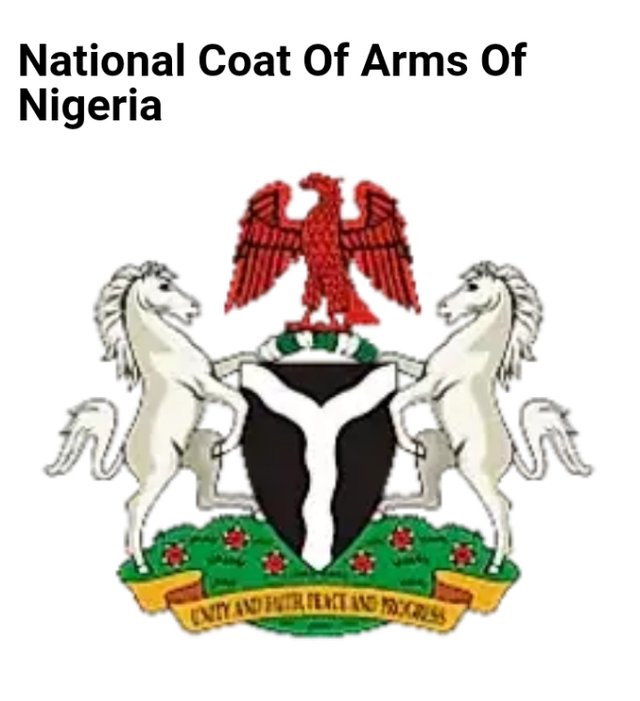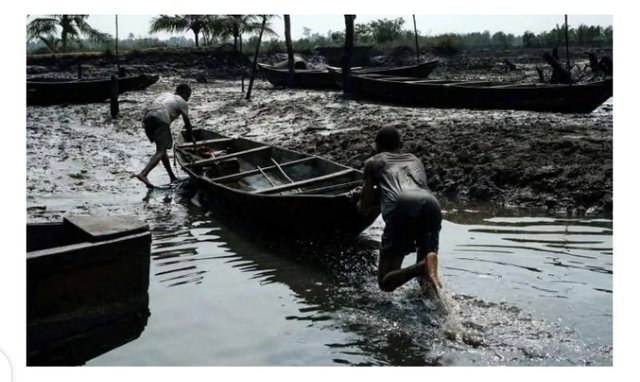Nigeria came into existence in 1914 as a result of the amalgamation of the Northern and Southern protectorates. She gained her independence in 1960 from Britain. Nigeria presently has more than 200 million people and it's the most populous black nation on Earth. The country is also blessed with abundant resources. It has more than 250 ethnic groups and over 500 language.

Nigerian coat of arms
https://www.worldatlas.com/flags/nigeria
Despite the abundant human and mineral resources which cut across land, water, soil etc. The country is faced with numerous challenges. These challenges ranges from insecurity, bad governance, poor infrastructure, environmental degradation etc.
Insecurity
Nigeria is currently facing one of most turbulence period of her existence. There is increasing insecurity in every part of the country. In the North Eastern part, Boko Haram and ISWAP are causing havoc, killing people, destroying properties and displacing inhabitants of the area.

Recovered ammunition
https://www.premiumtimesng.com/regional/nwest/264011-kano-police-recover-60-guns-ammunition.html
There are also increasing cases of banditry and kidnapping in the north. This is also evident in the increasing number of refugee camp and refugees spread across the region. In the south eastern part, the IPOB group are agitating for Biafra nation. This agitations has brought about clashes between the military and the agitators. Police stations, army checkpoints and government buildings have come under attack in the last months with both sides suffering casualties. Commercial activities have been grounded in cities like Owerri and Port Harcourt. More worrisome is the attacks by the Fulani herdsmen on some rural agricultural community in states like Benue in particular. Last week alone, more than 40 people were killed in such attacks. The level of insecurity is spread like wildfire across the whole country. The security situation is becoming more volatile in the south Western States as the celebration for the democracy day( June 12th) approaches with many regions of the country calling for a break up by lining up protest ahead of the occasion.
Poor Education
The quality of education has fallen significantly compared to the early days of the country. The challenges facing education in the country are numerous; they range from inadequate facilities, inadequate personnel, the use of outdated curriculum, lack of funding for universities, corruption and examination malpractices, incessant strikes, poor salary and working conditions for teachers/lecturers.

A lecture hall in a Nigerian public university
https://www.nairaland.com/attachments/11683870_ezynaptwsaaacp2_jpeg_jpeg8261ee37fd4c307041c915f89d629f98
These problems have resulted in the production of graduates that are unemployable. The unemployment rate of the country is at the highest with thousands of graduates churned out annually from the public and private tertiary institutions. In 2018, the unemployment rate stood at a staggering 28.6%. That means, with a labour force of 80.2 million, about 21.7 million Nigerians are unemployed and that exceeds the population of 35 of Africa's 54 countries. Presently, the unemployment rate stand at about 32.5%. I AM ONE OF THE UNEMPLOYED.
Poor Infrastructure
For a country that celebrated it's 60th independence anniversary blast year, everyone would have thought that the country should be in a better position in terms of infrastructure such as power supply, housing, health care, roads, water supply. The country has not really progressed in this area with roads in rural and urban areas largely untarred with potholes and poor drainages. Nigeria with it's abundant resources can not still provide constant power supply to the citizens. A country of over 200 million inhabitants can not generate more than 7000 MW of electricity. The current electricity has profound impact on small and large scale businesses by adding to the cost of production.
In the area of housing, most Nigerians can not boast of affordable and standard shelter over their heads. The health care system is not left out as most government health care facilities are underfunded. Most Nigerians especially in the rural areas have no access to good health care facility and portable water.
Poverty
Nigeria has one of the highest if not the highest poverty rate in the world. A statement credited to a world leader even referred to Nigeria as the poverty headquarters of the world. It recently overtook India as the country with the highest poverty rate. About 86.9 million live in severe poverty in Nigeria, which is about 50% of the entire population of the country.
Bad Governance and Corruption
Bad governance and corruption is the major driving force behind all challenges Nigeria faces as a nation. There is corruption everywhere in the country. Nigeria is ranked 149tg position in the Corruption Perception Index (CPI) out of 180 countries surveyed by transparency International.
Environmental Degradation
The exploitation of crude oil in the Niger Delta region as been accompanied with severe environmental degradation in the form of oil spills, water pollution, and atmospheric pollution from gas flaring. The case of the Ogoni oil spills still has not been cleaned up after several years.

Ogoni oil spills
https://m.guardian.ng/property/environmentalists-urge-definite-approach-in-ogoni-clean-up-exercise/
The impact of this environmental degradation has been profound on livelihood of the inhabitants, aquatic lives both fauna and Flora.
Recently, climate change has attracted global attention because of its consequences in the short run and long run. The impact of climate change engineered by Fossil fuels are becoming widespread in the coastal communities in terms of flooding. Places like Lagos and Yenegoa are in danger if global effort are not put towards cutting down on emissions.
Suggestion of solutions to the challenges facing Nigeria
The aforementioned challenges facing Nigeria are felt by all the inhabitants including me. However, this challenges are not insurmountable. Collectively and with a good government in place we can overcome together.
Problems such as insecurity can be tackled by encouraging regional policing. Each region having its own security structure. Security personnel should be trained and retrained to enhance their efficiency. Better funding and modern security gadgets should be provided.
Lin terms of infrastructure, large scale investment in infrastructural development especially in health, road network, power supply, housing etc.
Proper clean up of oil spills and law against gas flaring should be implemented to reduce atmospheric pollution. The implementation of international agreements such as the Paris agreement should be implemented in order to cut down green house gas emissions.
Thank for reading. I hope you enjoyed it.
Special mention to
@bright-obias
@belenguerra
@badsha1